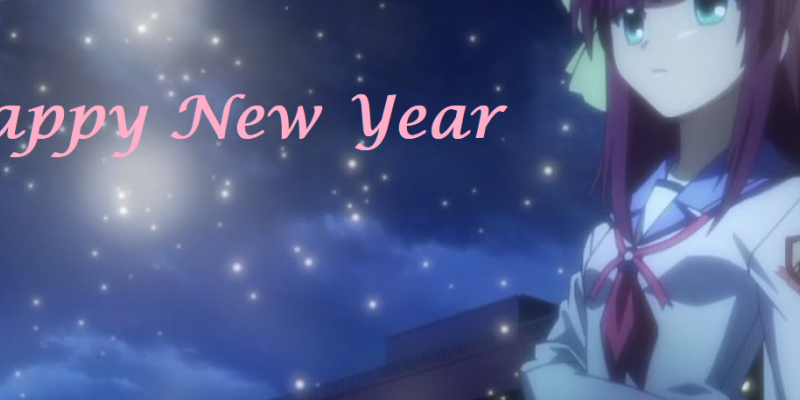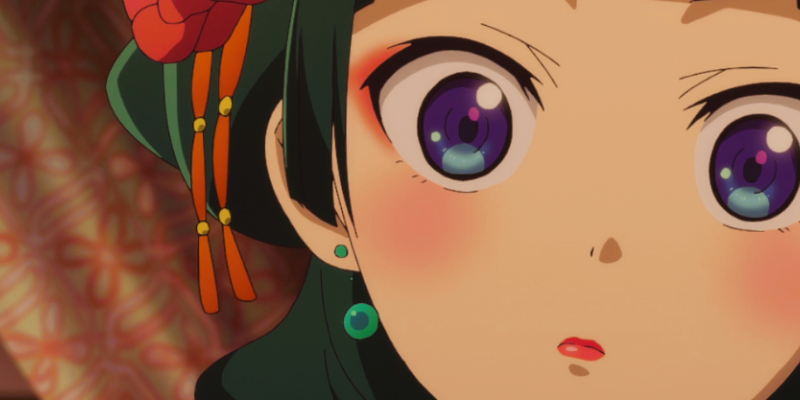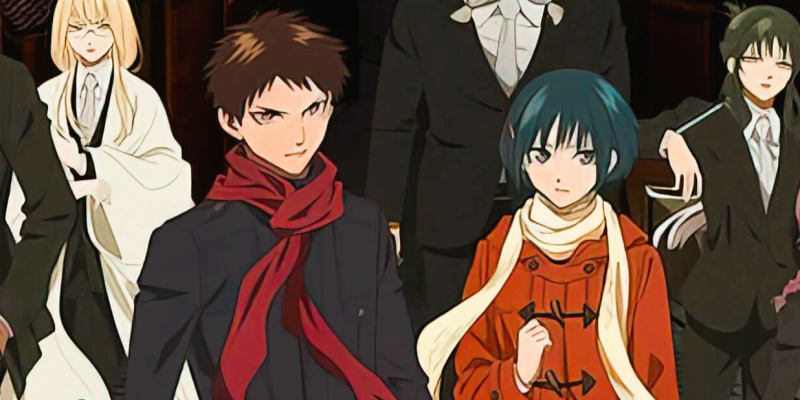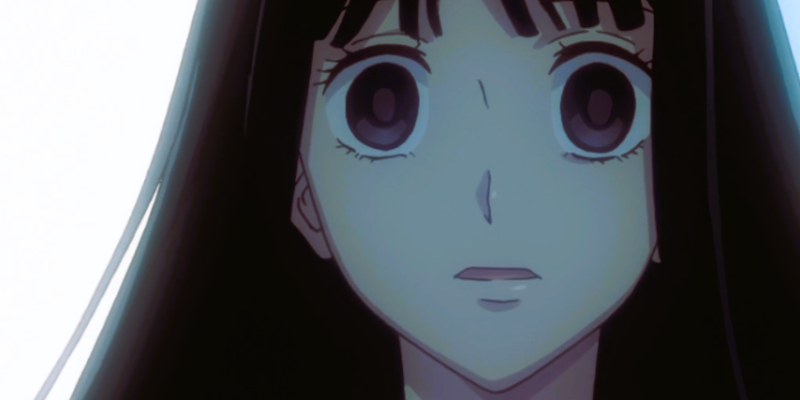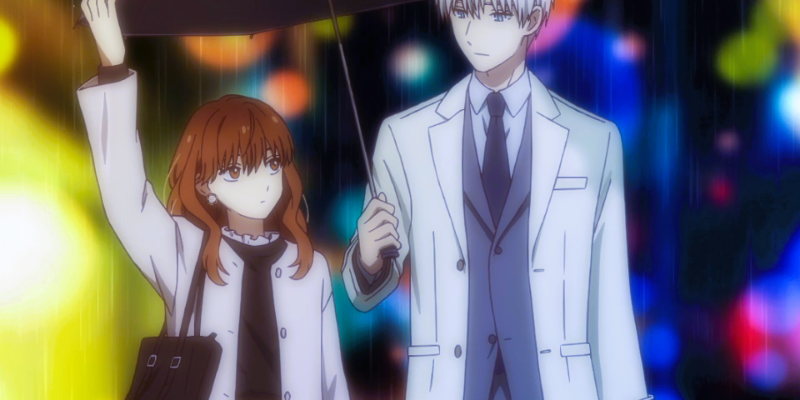- Episode Recap
- Interpreting The Ending
- Closing Thoughts
Episode Recap
The final episode of Orb: On the Movements of the Earth was full of interesting themes and topics for discussion. We’ll start with a recap of events. The episode began with child Albert being introduced to the academic circle by Rafal. After a short speech, during which he praised Albert’s bright mind, Rafal left the meeting early. He told Albert to be sure to stay for the entire meeting.

Albert didn’t follow that advice. He remembered that he hadn’t taken his nightly astronomy measurements. Being a very diligent boy, Albert hurried home. When he arrived at the house, he found Rafal standing over his father’s dead body, holding a bloody knife. While Albert stared in silent shock, Rafal explained that he killed the older man for refusing to share important cosmology research, and threatening to burn it instead.

Rafal was arrested by the townspeople shortly after the murder. Back in the present, adult Albert reiterated to the priest his decision to avoid academia. The priest talked with Albert for a bit longer, giving him some good advice about avoiding extremism. Rafal represented belief in a grand cause, and the father represented doubt about said cause. Rather than always believing or always doubting, perhaps one could do a healthy mix of both in life.

During the conversation, the priest also confessed his own sin to Albert. He once abandoned his companion in a way that resulted in his death. It became clear that the old, thoughtful priest was the golden-haired inquisitor from twenty-five years ago who helped interrogate Jolenta. I called him Goldie because we never heard his name. Anyway, Goldie felt guilty about his comrade’s execution for the rest of his life. However, he said that talking about it with another person helped.

Talking about things also helped Albert. After a blessing from the priest, he once again tried to trace the constellations in the night sky with his finger. As he did, he relived memories of his trauma and doubts about his life. He faced them bravely. Though Albert still agreed with most of what Rafal stood for, he couldn’t excuse murder. He resolved to embrace Thaumazein and continue the path of learning in a less extreme way.

After this decision, Albert was finally able to see the beauty in the world again. Before long, he started university. There, he would one day supervise Copernicus, who was inspired by his work. According to this anime, Albert became interested in heliocentrism after he overheard two men talking about the letter that Draka sent. The letter was for Potocki, promising him a share of profits from the publication of the book, “Orb: On the Movements of the Earth.” The book was never published, but the letter had an effect. Such is the conclusion of this anime.

Interpreting The Ending
In the previous episode review, I complained that the switch to an alternate universe felt too jarring. However, after the final episode, I think I understand a little better what the series was trying to communicate. I no longer believe this was an alternate universe, since the actions of Draka and other characters had clear effects even in the final episode. So then, how could Rafal be there? I have an answer that makes sense to some degree.

Albert’s teacher probably wasn’t supposed to be Rafal in a literal sense. But Rafal as a character was basically the personification of the passionate pursuit of knowledge. He stood opposed to religious tyranny and the suppression of human curiosity. For that reason, he was dragged into the final episode as a stand-in for a progressive academic. Nobody but Rafal is better suited to represent the spirit of inquiry that inspired Albert – as well as the monster that traumatized him.
I still don’t think bringing in a secondary, symbolic Rafal was the best move for a clear story, but it makes sense on a thematic level. Now we understand that this probably isn’t an alternate universe after all. Regardless, it’s cruel that so many good characters died just to pass on a single vague idea to Albert. The bleakness of this series is one of its most distinct elements, but it’s not bleak for the sake of being bleak alone. Let me elaborate.

Orb is dark and frustrating at times for two important reasons. First, it highlights the fact that potentially world-changing knowledge was regularly repressed before the scientific revolution. This series is a dark but poignant reminder of what can happen when a dogmatic religion or regime is allowed to control knowledge. Secondly, the bleakness of Orb means that the theme of human perseverance comes across even stronger. Humans will always have hope and find a way to improve life for each other.
There are many salient themes and messages in this anime. Some of them were highlighted for the last installment. In my opinion, the most important theme of the final episode was that extremism can corrupt even the most noble people. Everything Rafal said at that meeting was right, but his actions spoke louder than his words as he turned around and murdered a man for disagreeing with him.

As much as I harp on organized religion as a societal evil, it isn’t the only force of violent extremism. If Rafal had been a monarch, it’s possible that his regime of knowledge would eliminate dissidents as callously as Catholicism did before the Enlightenment. That’s why ethics and humanism are needed in science as well as everywhere else, and why progressive systems like democracy are better for everyone.
I took several years of Dialectical Behavior Therapy, which encourages walking the middle path and consulting the wise mind over the emotional mind. The benefits of flexible, dialectical thinking were huge in my life, so I strongly agree with the story motif of this episode. Extremism should be avoided, especially when it leads to violence and oppression.

Of course, different people may disagree on what counts as extreme. Some would say atheism – simply not being convinced of a god – is extreme. I may agree when I start knocking on people’s doors, intruding on medical care and government, chanting worship songs to Lady Science, and preaching about bloody sacrifices to children. Until then, I’m not concerned.
Closing Thoughts
I planned on a lot more discussion specific to this episode, but now that I’ve already written a decent episode review, it would be excessive to keep going much longer. Some of the interesting points of this episode include Rafal’s view on the future of academia; how seemingly insignificant events like Jolenta’s letter can potentially create great change; and what sacrifices may or may not be required in the pursuit of truth. Each topic is worth its own discussion eventually, but for this episode review, I’m already satisfied.

I’ve said before that Orb is my favorite anime of 2024, and it might be possibly my pick for 2025 as well. But honestly, it’s too early for me to say that. I need to re-watch a few times and hear a few different perspectives on it before I truly understand a series. It may be that my opinion of Orb drops in the next year or two. However, for now, I am highly impressed with this anime and would give it 9/10 as an initial rating.
With recent distractions, it’s been hard to keep up with my current blog schedule, so I probably won’t get to writing a series review for quite some time. After all, I’m still trying to write reviews for all the 2024 anime I watched. Sooner or later, however, I do plan on writing more content about this amazing anime. That’s all I have in my notes. I very much appreciate everyone who read or clicked on my reviews for Orb: on the Movement of the Earth. Sayonara~

~Thanks for reading~
Written by 7Mononoke
